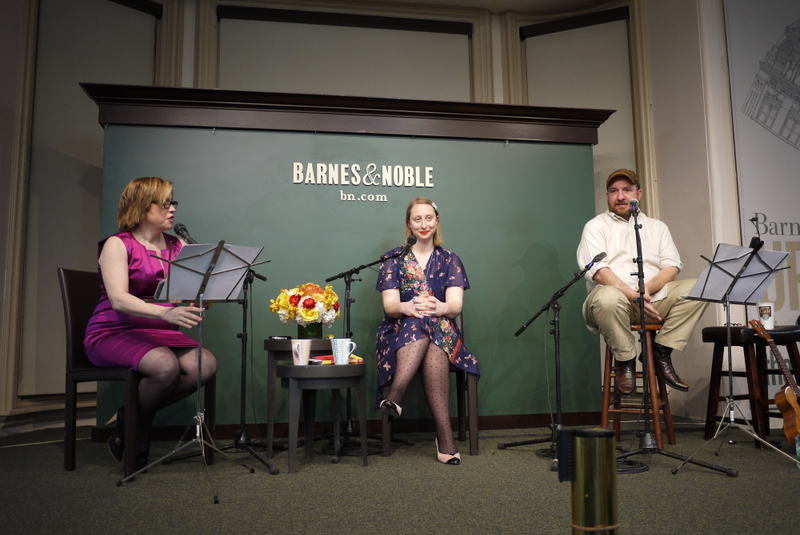
Upstairs at the Square takes place, as the name suggests, at the Barnes and Noble at Union Square. The series has an endearingly informal feel, with several rows of chairs arranged in an ad hoc manner, facing a sparse stage in front of a plain green backdrop. Pairing a writer with a musician gives the proceedings the feel of a laid-back variety show, as both perform selections from their work in turn. On Thursday, March 8th, Upstairs at the Square hosted a wide-ranging discussion of the work of Emma Straub and Stephin Merritt, punctuated by excerpts from each of their respective bodies of work. Both have new offerings on the market; Straub’s new book of short stories, Other People We Married, was reissued by Riverhead Books in February and Merritt’s group The Magnetic Fields released a new album Love at the Bottom of the Sea through Merge Records on March 11th.
My friend and I arrived just as the room was starting to fill. The crowd was pretty young, with a smattering of older attendees mixed in among the bearded, tousle-haired heads that lay between the stage and us. As we got settled, the chatter rose as the invitees entered the room from the back and stepped up onto the platform. Emma Straub wore a floral wrap with a rhinestone barrette and red lipstick. Stephen Merritt sat down on the right side of the stage in a worn white button-down and a wool baseball cap, a small nylon string guitar balanced on a stand beside him.
To the left of them sat the host, Katherine Lanpher. Mrs. Lanpher informed the audience that the discussion would be taped, and then requested that we turn off all ringtones, as they particularly irritated Merritt. “And it better not be a 50 Cent ringtone,” she quipped to laughter from the audience and the stage.
Emma Straub started off the evening with a discussion of the characteristics of the short story. “Short stories make you believe that everything is possible,” she said, her earnestness drawing an affectionate frown from Merritt. She pointed out that the length restriction prevents resolution of complex narratives, and is more suited to capturing specific feelings and moments. Though the narrative is often unfinished, a successful short story leaves many possibilities open.
She went on to reveal that her personal travels have often served as locational “casting calls” that catalogue unusual places she has been, mentioning in particular the strange vacation town featured in her short story, “A Map of Palm Springs.” The most autobiographical aspects of her writing are the geographical details, inspired by real events in her life. She described the inspiration for one particular scene, in which her recurring character Franny has a lesbian encounter with her friend Jackie in a ballroom. “We were in a ballroom where my mother was holding a tea for me. There was a pianist right beside us.” The theatricality of the scene became the perfect setting for the emotional crescendo of her characters’ first kiss.
The excerpts from Straub’s stories demonstrated a voice concerned with the interiority of the characters, coloring the mundane with vivid personal details and reactions that inject the narrative with otherwise unseen tensions. Straub’s characters inhabit a world where manners and social niceties set the parameters of interaction. The moments where those forms come undone lead to the catharsis and barely-restrained violence of stories like “Flyover State.”
Over the course of the night, the two guests provided a comfortable counterpoint to one another, with Straub’s affability sitting in contrast to Merritt’s laconic wit. Straub spoke a bit about her one-time gig as Merritt’s personal assistant, cataloging his instruments for insurance purposes. When asked what quality defined a musical instrument, Merritt replied, “If it doesn’t make a sound, it’s probably not a musical instrument. Your escalators are definitely musical instruments.”
Mrs. Lanpher noted that both artists tend to write characters that they then inhabit in their work. “It’s cheaper to write about it than to do it,” replied Merritt. When asked where these outside characters came from, Merritt replied “Brooklyn.”
“At least, these days,” Straub chimed in.
Stephin Merritt’s portions of the evening were light and funny. Renditions of “Andrew in Drag” and “Your Girlfriend’s Face,” darkly humorous tracks from his newest album, were crooned in a manner reminiscent of The Divine Comedy’s Neil Hannon mixed with Jonathan Richman. In conversation, Merritt was quick to crack jokes, which he uttered in a stilted, dry deadpan, like a chattier version of Dinosaur Jr’s J. Mascis. At one point he averred that he would have liked to write his own book, Eagles of North America, about the continent’s leather bar scene. At another juncture, he riffed on the importance of clichés for songwriting, noting that “words are clichés; clichés are just longer words. We can’t communicate unless we already know the same tropes. If you have three clichés it’s a genre; if you have four, it’s a style of genre, if you have five clichés, it’s a band, and if you have six clichés, it’s an album.”
The night finished on a particularly high note, as Merritt played perennial favorite “The Book of Love” from The Magnetic Fields’ most famous album, 69 Love Songs. When asked if he minded playing the song at every performance, he responded that the song changed its meaning depending on who was sitting in the first row. He then glanced out at the audience and shrugged, with comedic timing: “This time it will be boring, though.” This drew laughs as intended, before the requisite performance quieted everyone with its unironic, familiar tones.
Photo: Michael Fusco
Follow Vol. 1 Brooklyn on Twitter, Facebook, Google + and our Tumblr.
